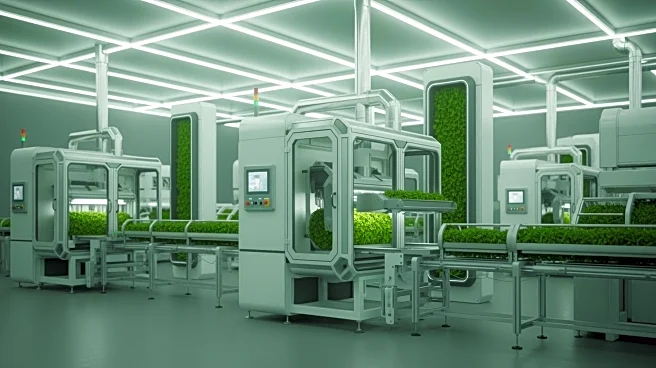What's Happening?
MATR Foods, a Danish startup specializing in plant-based meat alternatives, has raised €40 million ($47 million) to scale its operations. The funding, which includes equity from Novo Holdings and the Export
and Investment Fund of Denmark, as well as debt from the European Investment Bank, will support the construction of a 4,000-ton production facility in Ansager, Jutland, expected to be operational by 2027. MATR Foods uses solid-state fermentation to enhance protein levels and create savory flavors in ingredients like peas, lupins, beets, potatoes, and oats. The company aims to provide products that are low in saturated fat and high in fiber, without the need for additives.
Why It's Important?
The expansion of MATR Foods represents a significant step in the plant-based and alternative protein sectors, which are increasingly focused on sustainable and cost-effective solutions. By reducing reliance on traditional meat production, MATR Foods' approach could help decrease the environmental footprint associated with meat consumption. The company's innovative fermentation process offers a cheaper production method compared to other fermentation techniques, potentially making plant-based meat alternatives more accessible to consumers. This aligns with global efforts to mitigate climate change by reducing greenhouse gas emissions from livestock farming.
What's Next?
MATR Foods plans to target markets in Denmark, Germany, and Switzerland, where consumer interest in plant-based diets remains strong. The company is also exploring partnerships with retail and foodservice sectors to expand its market reach. As the new production facility comes online, MATR Foods will be positioned to meet growing demand for sustainable meat alternatives, potentially influencing dietary habits and food industry practices across Europe.
Beyond the Headlines
MATR Foods is not attempting to mimic traditional meat but rather create a new category of satisfying and craveable meat successors. This approach could shift consumer perceptions and expectations around plant-based foods, encouraging more people to adopt meat-free diets. The company's focus on using whole organic ingredients without additives resonates with health-conscious consumers and chefs, potentially driving broader acceptance of plant-based products.










